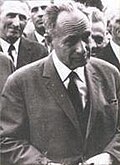| ||||||||||||||||||||||
All 460 seats in the Sejm | ||||||||||||||||||||||
|---|---|---|---|---|---|---|---|---|---|---|---|---|---|---|---|---|---|---|---|---|---|---|
| ||||||||||||||||||||||
| ||||||||||||||||||||||

Parliamentary elections were held in Poland on 30 May 1965. [1] They were the fourth elections to the Sejm of the People's Republic of Poland, and fifth in Communist Poland. They took place on 30 May. The lists admitted were controlled by the Front of National Unity (FJN), in turn controlled by the Polish United Workers' Party (PZPR).
Contents
The distribution of seats was decided before the elections by the FJN, with voters having no possibility to change it. The results of the 1965 election would be exactly duplicated by the 1969 and 1972 elections.

